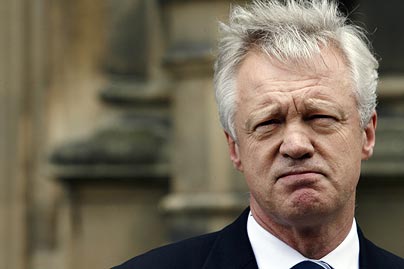Earlier today David Davis gave evidence to the Brexit Committee. My colleague Sarah MacKinlay watched some of it and gives some insight here.
Below is a snapshot of answers to just some of the questions he gave. This small yet informative snapshot illustrates just how out of his depth he truly is. He consistently contradicted himself. He was out of his depth. And was extremely thin on detail and generally looked uncomfortable and awkward and didn’t not speak with conviction.
ON BORDERS…
Joanna Cherry SNP MP: asked David Davis about borders. She explained how the Brexit committee was given evidence from a senior executive and trade advisor to Linklaters who is also a senior lecturer at Cambridge University. His evidence suggested that stated a CETA* type deal wouldn’t be compatible with the Northern border. The academic said: 1. There would have to be checks on VAT, so taxes are applied at the border. 2. There would have to be checks on products to check they could be sold and 3. checks on rules of origin to make sure products are coming from the right region.
The issue she said would be lack of openness of the border and the lack of structure at the border.
David Davis acknowledged that a “CETA arrangement doesn’t give us enough to go on (in relation to the Brexit deal) but that it gives us something to go on” – “it’s the starting point”, he says. This is somewhat meaningless. What is he talking about? How can we possibly consider replicating a CETA style arrangement?
ON TRANSITION ARRANGEMENTS…
Next to question Davis is John Whittingdale, Conservative MP: He asked: “what is the difference between transition and once we leave?”
Davis answered that we will not be subject to the duty of corporation which is what stops the UK arriving at trade deals now. “That freedom will exist”, he promised.
“There will be other changes one which is that EU citizens wishing to come to work will have to register,” he enthused. And then said: “It will be a variety of things like that”, in other words he wasn’t sure of the detail.
ON DRAFT NEGOTIATIONS…
John Whittingdale then went on to asked: “The European Council published their draft negotiations directives for the transition period. Can you say which of those we would not accept?”
David Davis replied: “I’ve avoided the leaked guidelines.” When pressed further about where there might be argument Davis replied he expected there to be issues around “doing outside negotiations” the very thing he had just said we can do once we are in the transition period!
David Davis explained he is relaxed about transition because “what matters is what happens after”. Yes, perhaps one of the things to be agreed on! It matters hugely what happens in the future.
He continued that he expected that “we will get an agreement on a transition period in the next 6-8 weeks. Not said in terms but intimated…”
Whittingdale then fairly asked “and how many meetings have you got organised between now and that period?”
To which Davis responded: “none”. So how exactly, is the transition going to be agreed if there are no meetings to agree on it?!
The transition period will be about two years David Davis confirmed. But insisted it’s not a number plucked out of the air…
Asked if negotiations will continue into the transition period he said: “No. Well there may be detailed issues to be resolved. But no not in principle. Bear in mind we can’t sign the thing (the deal) until we are a third country. That’s a problem for European law not us. Frankly that’s the logic of the strategy.” So that’s clear…
ON THE CUSTOMS UNION AND THE SINGLE MARKET…
Emma Reynolds: Asked if after exit day (and during transition) if the UK will remain in the single market and customs union?
“No”, said Davis, “because we won’t be a member of the EU at that point. But we in operation terms, from the point of view of looking at it from a business it will look the same.”
Reynolds went on – “but we won’t have a seat at the table”. To which Davis nodded and replied “yes”.
ON CITIZENS RIGHTS…
Richard Graham, Conservative MP: Asked: “European Union has published what it thinks are still the issues which need to be resolved concerning citizens rights are. What’s our Government’s analysis of what likely sticking points will be?”
Completely avoiding the obvious elephant in the room. Davis answered vaguely: “I don’t think there will be sticking points necessarily. The one sticking point is um err um the issue of err voting, because that is an issue for on one two member states.”
Addressing the issue of aforementioned elephant Richard Graham said: “You don’t think the issue of guaranteeing future free movement rights for British citizens across all the 27 countries?”
And Davis said: “That’s been a sticking point but the impression one was given anyway that the sticking point point… was that this is a future matter and they want to hold back on it.” Phew what a relief that’s been addressed….
But he didn’t stop there. Continuing with his statement he said:
“Bear in mind that will interact quite closely with, whatever we do on services, professional services in particular. So, the right to move around will be quite an important part of that. So, it may well be that they are holding that back as a bit of a bargaining chip for that part of the negotiations.” Not necessarily a bad sign. Not necessarily a bad sign.” Wagging his finger to indicate that he is on to something…

